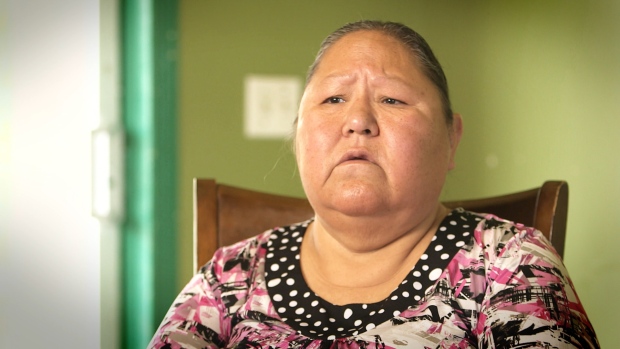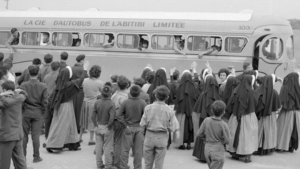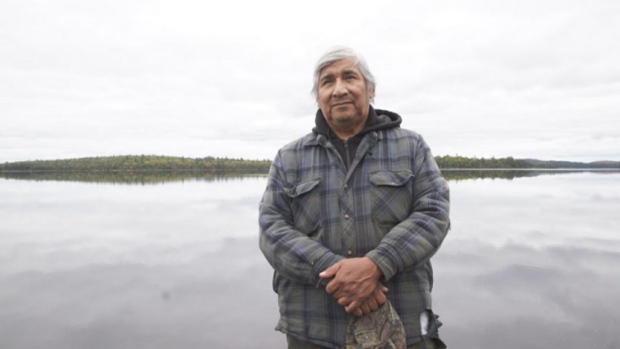An Untold History of Resistance to Residential Schools
By Josee Dupuis
Behind the stories of abuse that took place across Canada's residential schools, there are also never-before-told stories emerging of First Nations parents who tried to defy the government by hiding their own children. Radio-Canada's investigative journalism program, Enquete, spoke to families who fought back against the federally-run mandatory system. Marie-Jeanne Papatie remembers seeing her older brothers and sisters leave the First Nations reserve of Lac-Simon to attend residential school Saint-Marc-de-Figuery, near Amos in the Abitibi region in northwestern Quebec. The next summer, she recalls her father hearing about stories of abuse that took place at the institution. In shock, he decided he would not send his youngest daughter there. He came up with a plan: to hide five-year-old Marie-Jeanne. Her father made her sleep on a makeshift mattress in the basement of their family home. Through the window, she could see the street and the school bus picking up children.
Papatie said she still remembers her father's words: "Do not answer when we call your name." In the following days, Father Edmond Brouillard, who was fluent in Algonquin, walked around the reserve with a list of names in hand, to make sure all the children had been picked up. When Brouillard knocked on the door, Papatie's father said his daughter ran away from home to the lake. Once Brouillard left, Papatie was allowed to come out from her hiding place in the basement. Abused at age 8 While Papatie managed to escape residential schools, she still was not spared from abuse. When she was eight years old, Papatie was sexually assaulted by a family member, 19, who had been abused during his time at Saint-Marc-de-Figuery. 'I was spared from residential schools, but I still suffered their after-effects.' - Marie-Jeanne Papatie "I was spared from residential schools, but I still suffered their after-effects. What they lived through, they brought into the home," Papatie told Radio-Canada. "They made me live through what they lived through." After the abuse, her life crumbled. "I started using drugs at 11 years old. I would sniff gas," she said. "My father would hit me because he didn't want me to sniff. When I was abused at night, I would sniff the next morning." Papatie, who never told her father about the abuse, gets choked up when she speaks about the sacrifices he made to protect her from residential schools. "I am very grateful to my father. I never had the chance to tell him that I appreciate it very much," said Papatie, who gave up drugs 20 years ago. Lured with candy
William Papatie, Marie-Jeanne Papatie's husband, only spoke about his residential school experience for the first time at the Truth and Reconciliation Commission. He has vivid memories of his last summer at home, before he was taken away to a residential school. "The nuns came to visit us. They would give us lollipops to attract us. I wanted some. 'We'll give you some at school,'" the nuns told him. "That's how they lured us – with candy." William Papatie was five years old when he entered Saint-Marc-de Figuery boarding school, where he was abused repeatedly. He said a cleric would enter his room with candy. "When he came to see me, I didn't know what he wanted to do. He brought me in his room and gave me candy. That's when he started to touch me," Papatie said. He ran away from the school twice, but was caught by police and Father Edmond Brouillard picked him up at the station. After years of being afraid to speak out, William Papatie confided in his religious grandmother and father about the abuse. "My father ended up believing me because, at one point, I was bleeding." Salomon Papatie was in shock and wanted to save his son. At the end of the summer, the father and son travelled via canoe to a family campsite located about 100 kilometres away from the reserve. But Father Brouillard was on their trail. With the help of an elder in the community, he located the pair in the woods. William Papatie still remembers his father's words: "My son will not go back to school. His place is here now because of what he went through at the school. I believe him now." Brouillard left, without the boy. "I was so relieved. My father held me in his arms," Papatie told Radio-Canada. "I was surprised that my father was capable of such an act – defying a religious authority. I am very grateful to him." Father Edmond Brouillard convicted Father Edmond Brouillard was convicted in 1996 and sentenced to five years in prison for indecent assault, sexual touching, sexual assault and gross indecency. His victims were six First Nations people from the Lac-Simon and Lake Victoria areas in Abitibi. Saint-Marc-de-Figuery closed its school doors in 1973. The last residential school to shut down was in Regina, Sask. in 1996. 6,000 children dead A total of about 150,000 Aboriginal children were forced to attend the church-run boarding schools. It is estimated that 6,000 of them died of malnutrition, disease, physical abuse, suicide or froze to death after fleeing. Many children suffered sexual abuse at the hands of clerics. Few parents defied the government by refusing to send their children to residential schools, but some did. In the Truth and Reconciliation Commission report, a short chapter is dedicated to stories of resistance. The few cases mentioned occurred in Western Canada. No examples in Quebec are cited.
|
.
Any original material on these pages is copyright © BishopAccountability.org 2004. Reproduce freely with attribution.


